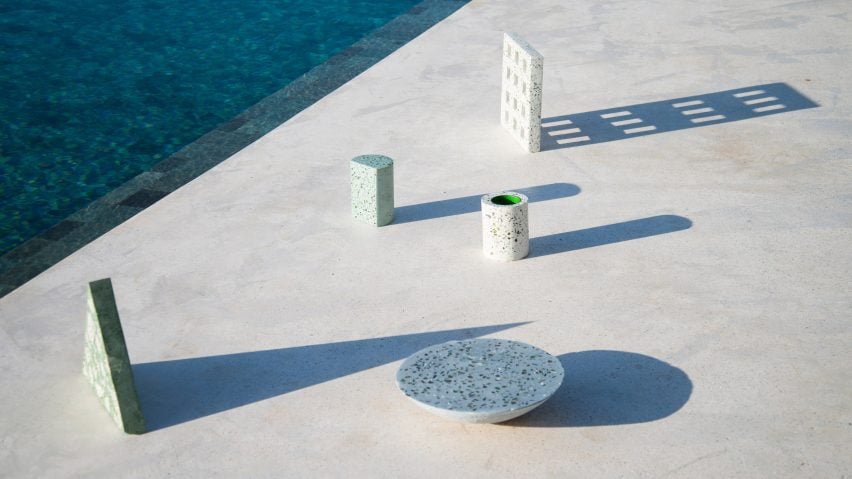Discarded glass is transformed into terrazzo to create this range of furniture and objects, which Dutch studio Super Local designed in collaboration with Zanzibari craftspeople.
The Bottle Up project shows how Zanzibar's trash can be turned into furniture, accessories and building materials – rather than going into landfill.
The project, presented at Dutch Design Week, features a series of colourful terrazzo homeware, including a bench, a table, a dish and a vase.
Super Local designers Luc van Hoeckel and Pim van Baarsen teamed up with design studios OS∆OOS, Stone Cycling and Klaas Kuiken for the project. The first collection launched after a visit to Zanzibar – a tropical island off the eastern coast of Africa – in 2015.
They realised there was no recycling scheme set up for the huge amount of discarded glass bottles left over from a booming tourism industry. In response, they teamed up with local makers and began making products using glass bottles collected from hotels.
By collecting the glass from hotels instead of sending it to landfill, the amount of waste material salvaged from the past year could have filled six shipping containers.
The Bottle Up collection was launched in 2015. It incorporated parts of glass bottles to create vases and jars.
But the designers wanted to find a more attractive way to use the waste – so developed a terrazzo that is manufactured using the recycled glass.
"It's hard to create nice products using broken or dirty glass," Van Baarsen told Dezeen. "That's how we eventually came up with terrazzo, which we made by mixing glass shards with cement."
Terrazzo is used throughout the second collection, named Trending Terrazzo, which is exclusively produced and sold on the island. Van Baarsen said the aim was to create something that could be useful to local resorts.
"A lot of hotels import their furniture from Bali, because it has the same 'island feeling'" he said. "But that's a shame, because Zanzibar has really skilled craftsmen, who weren't making stuff to suit the needs of local hotels."
For the latest phase of the project, Dutch designer Lou van Reemst discovered a type of limestone cement that doesn't deteriorate when mixed with glass. This results in a stronger terrazzo material, which the studio is now using to create building blocks.
The project draws on the same themes as a series of talks hosted by Dezeen, as part of our Good Design for a Bad World initiative. The talk looked at whether designers can make a difference on global issues such as climate change and pollution.
According to Van Baarsen, the potential uses of Zanzibar's waste glass go far beyond small objects.
Currently local builders are forced to import sand from Australia, because the island's natural sand is too soft to use as a construction material. But it is possible to create a more useable sand by simply crushing waste glass.
Van Baarsen believes a change in the construction supply chain could have a hugely positive effect on the island.
"It's up to the craftsmen now," he said. "Within a year, it would be great to have an update and see what can be improved."
"The focus is now on scaling the project, and starting to produce the building blocks – that's really exciting because then we can make big steps."
The Bottle Up initiative was established by Hubert and Elisabeth van Doorne in collaboration with Dutch Design Week, who sent six Dutch studios to Zanzibar in 2015.
Super Local showcased their glass objects at Veemgebouw in Eindhoven last month, while van Reemst displayed the bricks at Klokgebouw.
Dezeen hosted five talks during the week-long festival, covering other global issue including politics and refugees. All of these talks are available to watch via our Good Design for a Bad World page.
Photography is by Jeroen van der Wielen, unless stated otherwise.

